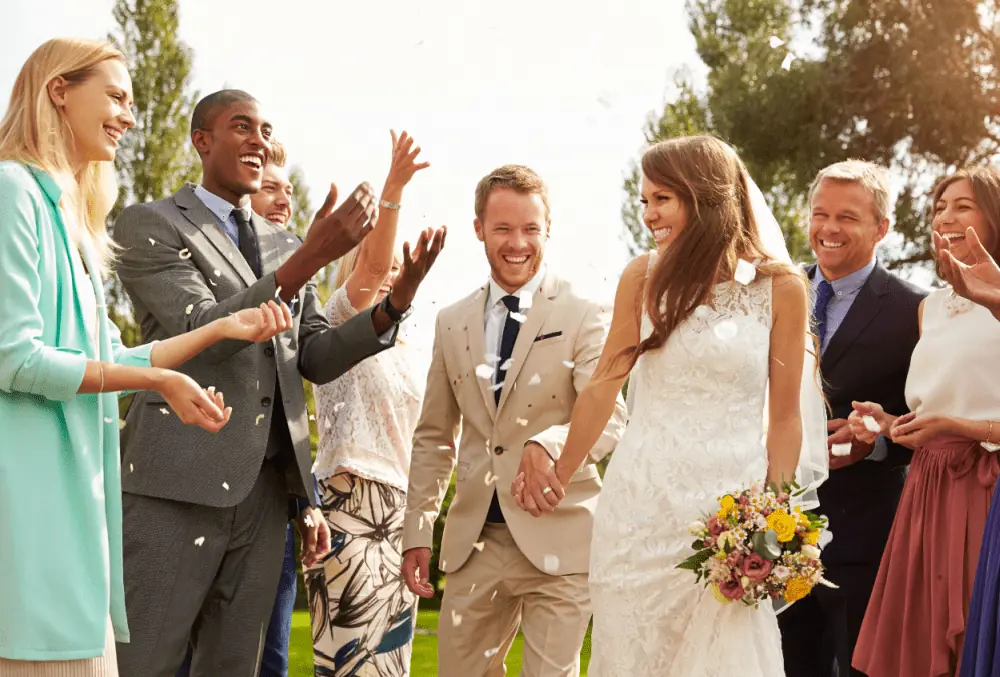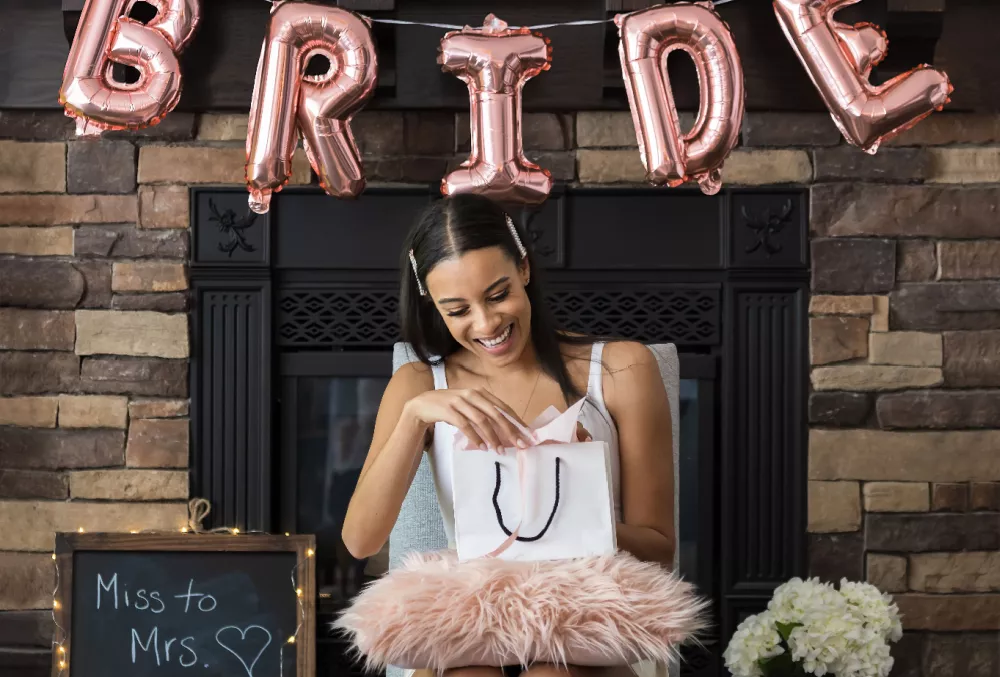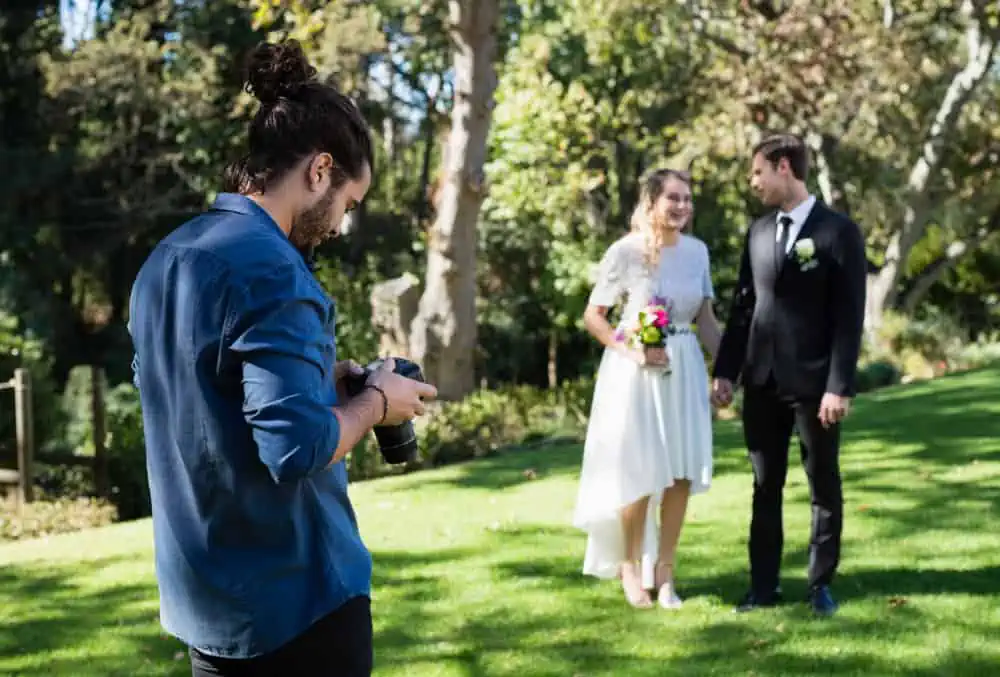Weddings come in all shapes and sizes, and fortunately, you can customize your wedding to accommodate just as many or a few guests as you wish. However, one troublesome question many couples face during wedding planning is: how many people should you I invite to your wedding?
Awesomebridal recommends inviting 80-120 guests to a wedding. That’s the optimal number that won’t cut important people out of the wedding. Also, the wedding guest list won’t be too small or extensive.
But why 80-120 guests? Here’s the reason: different numbers of guests seem appropriate for different couples. But, there is some consensus to these numbers; a wedding with more than 200 attendees is considered a “large wedding”. A wedding with 100 and 200 guests is considered average and anything below 80 is considered small.
That’s why we find 80-120 guests to be optimum as it lies in between small and medium and not too far from a large wedding.
- Your budget
- The venue capacity
- The overall vibe
Continue reading to find out more on how to create a wedding list, factors that affect the wedding guest size, and most importantly who you should invite to your wedding.
Factors affecting the total wedding guest count
Below are a few factors that affect the wedding list size.
1. Venue capacity
Some couples adjust the choice of space depending on the set number of guests. Others are clear from the beginning that they want to get married on a beach or in a tiny rural church in a very personal ceremony so they adapt the wedding guest list to the possibilities of the space. Whatever you decide, there is no wrong way.
If you have finally found the place you have always desired and, unfortunately, it is with limited space, you have a valid excuse to cut down the number of wedding invitations, always explaining the reason to those closest to you who will ultimately be unable to attend.
On the other hand, if you have a clear vision of the size of the big event and decide to make the final draft of the guest list for the wedding first and then go hunting for wedding venues, that is also a great idea. It will narrow down the venues from the list to visit because now you can exclude all those places which are too small or overly big for your set guest count. You surely don’t want your meticulously planned event to feel overcrowded and you definitely want to avoid having an “empty” wedding with a venue too big and a guest number too small.
2. Budget
Before you start making a guest list, it is necessary to know exactly the budget available to organize and celebrate the wedding. Knowing how much funds you have at your disposal will allow you to know how many people you should invite to your wedding and thus be able to think about the venue that will accommodate the number of guests that you have estimated.
A wedding is a very special moment that most protagonists want to share with as many people as possible. Although some couples prefer not to go overboard and invite only their closest friends, the normal thing is to spare no expense when it comes to the most important event of a couple and go with the famous one “the more the merrier”.
However, it is important not to go overboard with the number of guests, as it is closely linked to the budget, and knowing how to calculate it will help you a lot.
3. Vibe
Setting the tone of the wedding is another thing you must do before coming up with the wedding guest list. Are you the fancy couple who always goes big or goes home, or do you enjoy more cozy and personal gatherings where a few people give more meaning to an event than a whole bunch of them?
If you want a big extravaganza, you have to prepare a long list of invitees and throw a big bash which will be unforgettable and lavish. That means you have to discard all budget-friendly outdoor ceremony ideas you might find cute and go for grand venues that will fit a large gathering.
Dreaming of a small but sweet beach ceremony with only your nearest and dearest present? In case you want that super intimate vibe and your main idea is just to share that special moment with your closest friends and relatives, it is obvious that the guest count will be small and that is perfectly fine.
Categories of people to invite
There are eight categories of people you should consider when putting together the wedding guest list.
1. Family
As the most significant group of people, family always comes first on the list. But regardless of how big your or your fiancé’s family is, set boundaries on how far you want to go and who will be part of the list of wedding guests. Are you stopping on first cousins, or you will do the big celebration and go up to the third-generation cousins?
Because there are always those distant relatives whom you don’t really know or have seen only twice, but your parents insist on including them in the wedding because they are family. It is really important to have this conversation and set limits, first with your husband-to-be, and then with the parents to straighten things up and be clear in determining where that family cut gets made.
The ultimate goal is to create a wedding guest list related to the family members that you feel good about and relatives that actually matter and will genuinely want to be part of your celebration.
2. Friends
The best way to see who among your friends makes it to the wedding guest list is to narrow it down to the number of friends whom you actually spend time with.
Think about when was the last time you went out for a meal or drinks or hung out together. If that period is longer than two years, you don’t have to feel obligated to invite them. Save that place for people who are truly close and care for you, who would really want to witness the happiest day of your lives.
3. Family friends
This group is related to friends or coworkers of your parents and people who are not directly related to you but are still associated with your family.
In case your parents will participate in covering the wedding costs, they will expect to have some say in whom to invite, even people you don’t really know too well.
If you choose to have a bigger event and you really can make room for a few people more, it is best to give that pleasure to both the bride and groom’s parents when they already participate in paying the wedding expenses. The best way to handle this is to set an exact number of guests that your parents from both sides can invite to your wedding. Tell them they both have one table each to fill with guests of their choice and hand them an equal number of blank wedding invitations, but they must not go over that number whatsoever.
From another standpoint, if you plan a smaller and more intimate event and you don’t want to come across any unfamiliar faces at your wedding celebration, you must sit down with your parents and have that conversation, regardless of how difficult it might be.
4. Kids
There is no right or wrong way when it comes to choosing whether you should have kids at your wedding, it usually depends on your preferences. Whatever you decide, you need to draw a line if you are making an adult-only affair or if kids are welcome as well.
5. Plus ones
Even though bringing a ‘plus one’ to the wedding is always a super fun idea from the guest’s point of view that is not the case with the couples. Because plus ones mean more space, more food, and more drinks which equals more money.
Here is one thing you can do: instead of making room in the wedding guest list for all single people’s additional guests, you can limit that number by inviting only ones that are in a serious relationship and not just casually dating. That way you can avoid having too many unfamiliar faces come across at your wedding.
Be sure to include plus-ones for the invitees who wouldn’t know anyone else, like coworkers for example. It would be nice to have someone familiar there so that they are not by themselves, not knowing anyone else.
6. Work colleagues
When deciding how many wedding invitations to hand out at your workplace and whom to invite from your work associates, think about whom you are inviting just out of obligation and who are the people you really want to see there.
Be careful about how many wedding planning details you are sharing at work, because if you are not planning to invite your coworker and you discuss together your wedding planning process, things might get a little bit uncomfortable. If the person sitting next to you at the office is hearing every single detail about the wedding, chances are they might think they will be invited to the wedding. And if that’s not what you’ve planned, someone will get disappointed.
That is why the best way is to limit the wedding content you are sharing at work.
7. Tricky guests
This category is for the wedding guests that you know they can cause drama. Some of them might make other guests feel uncomfortable, some are divorced or are someone whom you don’t really like too much but your fiancé wants to make their name appear on the wedding guest list.
The important thing to remember here is that this is your day, your one-and-only event and it is the right time to make it about only you two instead of putting someone else whom you don’t even really like first. Make a decision on what makes you happy, not the others. Just don’t let get mixed up in all the drama and invite who you want to invite.
8. Bridal shower guests
As a rule of the thumb, it is expected that the guest who you invite to your bridal shower will be invited to the wedding. Therefore, should you invite someone to your bridal shower, it is expected that they will be invited to the wedding.
How to create the wedding guest list – what’s the priority?
The wedding guest list begins by writing down all the names of those people whom you would like to join you on that special day. So take a pen and paper, or create a spreadsheet and start jotting down the following list in the order below.
‘Must-have’ guest list
When creating it, start with your ‘must haves’. These include people you can’t imagine marrying without, the closest and most special people in your lives whom you would love to share that special moment with.
These could be your immediate family (parents, siblings, nephews, cousins) and closest friends — people that really matter in your life.
This list is short but it will be your starting point.
‘Would love to have’ guest list
These are the people you would really want to include in the wedding. They are slightly less important than the must-haves but are the top 50-100 people you would love to celebrate your marriage with. Family relatives and friends from both sides belong to this group.
The length of this list depends on the factors mentioned earlier, like the budget, the venue, and the desired vibe and size of the wedding.
’Would be great to have’ guest list
On this guest list for the wedding, you will write people that would be great to have at your celebration, but it won’t ruin your day if they won’t make the final draft of the wedding guest list, or if the budget or the venue doesn’t allow it.
This list is for your work associates, college friends, neighbors, distant relatives, and generally people you are not very close like see each other on a daily basis, but you still have contact and manage to arrange a meeting at least once a year.
If you opt for a big or average wedding size, you should consider inviting these cluster of people. However, if you envision a small and intimate version, you may opt to forego these guests.
Common Wedding Guest List Issues + How to Solve Them
When creating a wedding guest list, you might come across some issues. Here are the most common ones and some tips on how to solve them most efficiently.
-
Uninvited people
These are some of those pushy persons who will invite themselves to the big event without even receiving a wedding invitation.
In this situation, honesty is the best policy so you can kindly and tactfully inform such person that the wedding guest list is full or that you are organizing a smaller ceremony with only the closest friends and relatives. Don’t think you are being rude, it is the other way round — it was actually rude of them to invite themselves to the wedding.
-
People that don’t get along
These are often divorced couples, ex-partners, friends in fights, etc. The best way to deal with the drama between these people is to make sure they don’t cross paths. It will be better if they are not in the same photo together and they don’t share the same table. Just do whatever you can to avoid any uncomfortable and awkward situations between them.
-
Troublemakers
There is always that person at weddings in charge of making a mess, who will attempt to try to ruin your big day. They could be a nuisance by drinking too much and making a fool of themselves, disturbing other guests, or having a habit of picking fights.
You must think twice before deciding to invite such. If you agree to include them, you can appoint someone to keep them in check.
Conclusion
Wedding planning takes time, and there are many decisions you and your partner will need to make along the way. The first and most important decision is whom you will invite. If you ask yourself “How many people should I invite to my wedding?” you’re not alone. By following the tips shared in coming up with the wedding guest list, you will be able to arrive at an optimal number.
Frequently Asked Questions (FAQs)
How many guests should I invite to my wedding?
This depends on the wedding budget, the venue capacity, and the desired vibe.
Whom should I invite to my wedding?
The immediate family and your closest friends always come first. Others you can invite include; family friends, and work colleagues.
What percentage of wedding guests actually attend?
Count on 80% of your total guest list number.
What is the rule of thumb for a wedding guest list?
А good rule of thumb is that if you haven’t talked in two years, you don’t need to invite them.
What is the average number of guests at a wedding?
The average number of wedding guests is around 150-200 people.
How many invitations should I order for 150 guests?
The best thing to do is order around 60% of the total guest number, plus 10 invitations to spare. So for 150 guests, you will need approximately 90 invitations plus 10 more.
How many guests decline to come to the wedding?
On average, around 20% of the people invited usually decline the RSVP.


